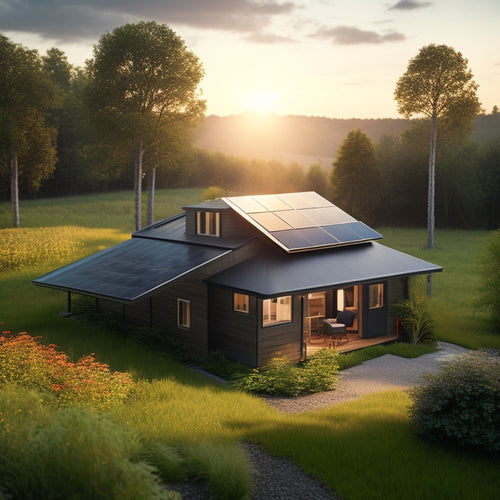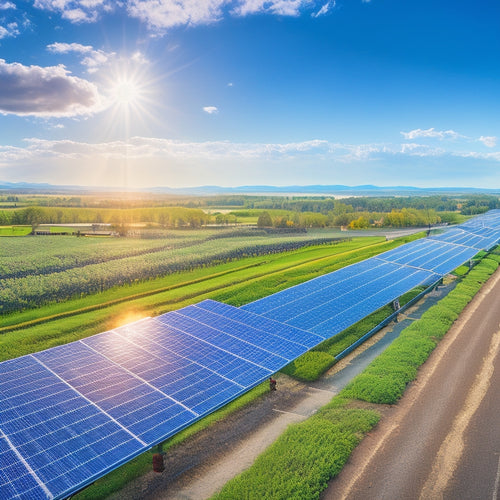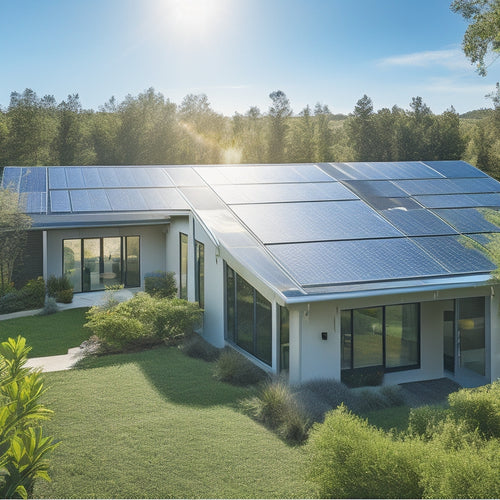
Building a Solar Panel Backup System for Off-Grid Living
Share
Building a solar panel backup system for off-grid living lets you control your energy consumption and costs. Start by evaluating your daily energy needs and identifying efficient solar panels that suit your setup. Consider lithium batteries for storage, as they offer longer lifespans and less maintenance. Take advantage of available grants to offset upfront costs and enhance affordability. Over time, this investment pays off through reduced utility bills and increased property value. By choosing this path, you're embracing energy independence and sustainability. There's much more to investigate regarding system design and maintenance that can optimize your off-grid experience.
At a Glance
- Assess your daily energy consumption by listing appliances and their wattage to tailor your solar panel system effectively.
- Choose high-efficiency solar panels, like monocrystalline, to maximize energy output in limited space.
- Select appropriate battery storage, such as lithium batteries, for reliability and longevity in off-grid systems.
- Take advantage of available grants and financing options to reduce the initial investment of your solar panel system.
- Focus on maintenance considerations to ensure long-term performance and lower costs of your solar energy system.
Cost-Effective Energy Solution
When you consider a solar panel backup system, the initial investment may seem intimidating, but it's essential to analyze the long-term savings potential.
By integrating renewable energy systems, such as solar panels, you can effectively reduce your reliance on traditional energy sources, ultimately lowering your utility bills over time.
This strategic investment not only pays off in financial terms but also enhances your energy independence, allowing for greater energy autonomy.
Initial Investment Analysis
Investing in a solar panel backup system for off-grid living can initially seem intimidating, but it's essential to assess the long-term financial benefits. The upfront costs include installation expenses, which can vary based on system size and complexity.
You'll need to reflect on factors like site assessment, equipment quality, and labor costs. To ease the burden, investigate various financing options available. Many companies offer flexible payment plans, allowing you to spread the cost over time.
Some grants and incentives may even help offset your initial investment, making solar energy more accessible. Moreover, the right system can notably reduce your reliance on traditional power sources, leading to greater energy independence.
This freedom from fluctuating utility bills and energy price hikes can be liberating. While the initial investment may be intimidating, remember that you're not just buying equipment; you're investing in a self-sufficient lifestyle.
Long-Term Savings Potential
Once you've traversed the initial investment terrain, it's time to evaluate the long-term savings potential of a solar panel backup system. By utilizing solar energy, you're not just reducing your dependence on the grid; you're also positioning yourself for significant financial savings over the years.
Consider the following table that outlines the potential savings:
| Year | Savings from Energy Efficiency | Financial Incentives |
|---|---|---|
| 1 | $200 | $1,000 |
| 2 | $250 | $0 |
| 3 | $300 | $0 |
| 4 | $350 | $0 |
These numbers illustrate how quickly your system pays for itself. While the upfront costs can seem overwhelming, the combination of energy efficiency savings and available financial incentives can drastically shorten your payback period.
As you invest in a solar panel backup system, you're not just buying technology; you're securing your financial freedom from rising energy costs. Adopt this cost-effective energy solution and enjoy reduced utility bills, increased property value, and peace of mind knowing you're contributing to a sustainable future.
Sustainable Energy Independence
Achieving sustainable energy independence offers you significant benefits, including reduced reliance on fossil fuels and lower energy bills.
By utilizing solar power, you not only enable yourself but also contribute to a substantial decrease in your carbon footprint. This change isn't just about saving money; it's about making a positive impact on the environment for future generations.
Additionally, integrating high-efficiency solar panels and battery storage can optimize your energy consumption and improve your self-sufficiency, ensuring a reliable power supply year-round.
Benefits of Energy Independence
Embracing energy independence through a solar panel backup system can greatly improve your off-grid living experience. By utilizing the sun's power, you'll not only achieve self-sufficiency benefits but also enjoy significant lifestyle improvements. This independence means you're no longer at the mercy of fluctuating energy prices or unreliable utility services.
With a solar panel backup system, you gain control over your energy consumption. You can produce electricity for your essential needs, whether it's lighting, heating, or powering appliances. This empowerment allows you to design your life on your terms, freeing you from the constraints of traditional energy sources.
Imagine the peace of mind knowing you can generate your own power, especially in remote locations where grid access is limited.
Additionally, energy independence strengthens your resilience. You'll be prepared for emergencies or natural disasters, ensuring that your daily routines remain uninterrupted.
The self-sufficiency benefits extend beyond energy; you'll cultivate a deeper connection to your environment while embracing a sustainable lifestyle. Ultimately, adopting this approach not only enhances your life but also nurtures a sense of freedom that's truly priceless.
Reducing Carbon Footprint
By utilizing solar energy, you can greatly reduce your carbon footprint and contribute to a more sustainable future. Switching to solar power isn't just about energy independence; it's a critical step toward minimizing your environmental impact.
When you capture the sun's energy, you eliminate reliance on fossil fuels, which are a significant source of greenhouse gas emissions.
Incorporating carbon offset strategies, such as planting trees or supporting renewable energy projects, can further enhance your commitment to sustainability. By adopting these practices alongside your solar panel system, you're actively participating in a larger movement towards ecological balance.
Moreover, consider other sustainable lifestyle choices that complement your solar energy use. Opt for energy-efficient appliances, reduce water consumption, and adopt minimalism in your consumption habits.
Every small change contributes to your overall carbon reduction goals.
Key Components Overview
When setting up your solar panel backup system, understanding the selection process for solar panels and battery storage options is vital.
Choosing the right components not only maximizes efficiency but also guarantees your off-grid living experience meets your energy needs.
Let's investigate the essential factors to take into account for both solar panels and battery systems.
Solar Panels Selection Process
Selecting the right solar panels is essential for optimizing your off-grid living experience. The panel efficiency, which indicates how much sunlight is converted into usable electricity, plays a critical role in your system's overall performance. Higher efficiency panels may cost more initially, but they can save you space and increase output.
When considering installation techniques, think about the angles and orientations that will maximize sunlight exposure throughout the day. Use the table below to help you compare different solar panel options:
| Panel Type | Efficiency (%) | Installation Techniques |
|---|---|---|
| Monocrystalline | 15-22 | Fixed mounts, adjustable racks |
| Polycrystalline | 13-16 | Fixed mounts, ground mounts |
| Thin-Film | 10-12 | Flexible installations, building-integrated |
Evaluate your specific energy needs, budget, and available space when selecting panels. Remember, the right choice will enhance your independence and elevate your off-grid lifestyle. By understanding these key components of the solar panel selection process, you're taking a significant step toward achieving the freedom and sustainability you desire.
Battery Storage Options
How can you guarantee a reliable energy supply in your off-grid setup? The answer lies in choosing the right battery storage options.
Lithium batteries are becoming popular due to their longer battery lifespan and higher energy capacity compared to traditional lead acid batteries. They require less maintenance and offer superior energy management, making them ideal for off-grid living.
When selecting batteries, consider your energy needs and the capacity required to power your home during low sunlight periods. A well-sized solar inverter and charge controller will optimize energy flow, making certain your batteries charge efficiently and safely.
Installation considerations are vital; make certain you have adequate ventilation and space for your battery system. Both lithium and lead acid batteries come with safety features, but lithium batteries typically have built-in management systems that enhance safety and performance.
Regular maintenance is essential, particularly for lead acid batteries, which may require topping off with distilled water.
Ultimately, your choice between lithium and lead acid batteries will depend on your specific energy needs and budget, but investing in the right battery storage solution is key to achieving true off-grid freedom.
Selecting Based on Energy Needs
To effectively select a solar panel backup system, you need to assess your daily energy consumption and evaluate your peak power demand.
Conducting an energy needs assessment will provide understanding into your usage patterns, helping you better comprehend how much energy you require.
Grasping these factors will help you determine the right system size to meet your off-grid lifestyle.
Accurate calculations not only guarantee you have enough power but also prevent overspending on unnecessary capacity.
Assessing Daily Energy Consumption
Evaluating your daily energy consumption is essential when designing an effective solar panel backup system for off-grid living. By understanding your energy usage and consumption patterns, you can tailor your solar setup to meet your specific needs. Start by listing all the appliances and devices you use, along with their wattage and the hours you operate them daily.
Here's a simple way to track your energy consumption:
| Appliance | Wattage | Hours Used Daily |
|---|---|---|
| LED Lights | 10 | 5 |
| Refrigerator | 150 | 24 |
| Laptop | 50 | 8 |
| Microwave | 1000 | 1 |
Add the total watt-hours for each appliance to determine your overall energy needs. Multiply the wattage by the hours used for accurate figures. This assessment will help you decide how many solar panels and batteries you'll need for your off-grid lifestyle. Knowing your consumption patterns also enables you to make conscious choices about energy efficiency, ultimately giving you greater freedom and sustainability in your living situation.
Evaluating Peak Power Demand
Understanding your peak power demand is essential for designing a solar panel backup system that effectively supports your off-grid lifestyle. By evaluating your energy usage patterns, you can identify when your power needs are at their highest. This peak demand forecasting helps guarantee that your solar setup can handle those bursts of energy consumption, preventing outages and maintaining your independence.
Start by tracking your appliances and their power requirements. Note which devices you use simultaneously and during what times of day. This will give you a clear representation of your peak power demand. For instance, if you're running multiple high-consumption devices like refrigerators, air conditioners, or power tools, your system must be sturdy enough to accommodate those loads.
Once you've established your peak demand, you can determine the necessary size and configuration of your solar panel system. This customized approach allows for a more efficient, reliable setup, guaranteeing you have the energy freedom you desire.
Don't settle for a one-size-fits-all solution; personalize your system based on your unique energy needs to truly thrive in an off-grid environment.
Lower Long-Term Maintenance Costs
When you choose a solar panel backup system, you greatly reduce your long-term maintenance costs.
With fewer mechanical components and a lower likelihood of breakdowns, you'll face fewer repair expenses over time.
This not only saves you money but also provides peace of mind as you enjoy your off-grid lifestyle.
Reduced Repair Expenses
Investing in a solar panel backup system can considerably lower your long-term maintenance costs. By utilizing renewable energy, you're not just gaining independence from the grid; you're also minimizing the need for frequent repairs.
Traditional energy systems often require costly and cumbersome repair techniques, but solar technology is designed for durability. With fewer moving parts, there's less that can go wrong.
Moreover, many solar panels come with extensive warranty options. These warranties typically cover defects and performance issues for 20 years or more, reducing the financial burden of unexpected repairs. If something does go wrong, you can rely on these warranties to handle the repair costs, ensuring you're not left with hefty bills.
Additionally, regular maintenance for solar systems is minimal. Simple cleaning and periodic checks are usually sufficient to keep your system running efficiently.
Frequently Asked Questions
How Do I Determine the Right Battery Size for My System?
To determine the right battery size, calculate your energy needs and consider battery capacity. Aim for a depth of discharge around 50% to extend battery life and guarantee you've enough power when you need it.
What Are the Best Solar Panel Brands for Off-Grid Setups?
When choosing solar panel brands for off-grid setups, prioritize high solar panel efficiency and solid warranties. Brands like SunPower and LG lead the market, ensuring you get reliable performance and long-lasting energy independence for your needs.
Can I Connect My Backup System to the Grid Later?
Yes, you can connect your backup systems to the grid later. Just make certain your setup meets local regulations and standards. This flexibility allows you to tap into grid benefits while maintaining your energy independence.
How Do I Troubleshoot Common Solar Panel Issues?
To troubleshoot common solar panel issues, check connections and guarantee proper solar panel maintenance. For inverter troubleshooting, monitor performance indicators and inspect for error codes. Regular checks enable you to maximize efficiency and maintain your energy independence.
What Permits Do I Need for Installing Solar Panels Off-Grid?
When Sarah installed her solar panels, she maneuvered local regulations and guaranteed compliance with safety standards. Don't forget to check installation requirements and environmental considerations to avoid future complications and secure your freedom.
Explore More
In the quest for energy independence, building a solar panel backup system is like planting your own garden of power. With careful planning and the right components, you're not just harvesting sunlight; you're cultivating a sustainable future. By investing in this cost-effective solution, you reduce your reliance on traditional energy sources and minimize long-term maintenance costs. Welcome the sun's potential, and let it illuminate your path toward a self-sufficient lifestyle, where freedom and sustainability intertwine.
Related Posts
-

Diy Off Grid Solar
By embracing DIY off-grid solar, you can break free from grid dependence, slashing your energy bills by up to 90% and...
-

Applications of Photovoltaic Systems
Photovoltaic systems are versatile, converting sunlight into electricity for various applications. You can use them i...
-

Installing Metal Solar Roofs for Maximum Energy Efficiency
Installing metal solar roofs can drastically enhance your home's energy efficiency and durability. These roofs withst...


